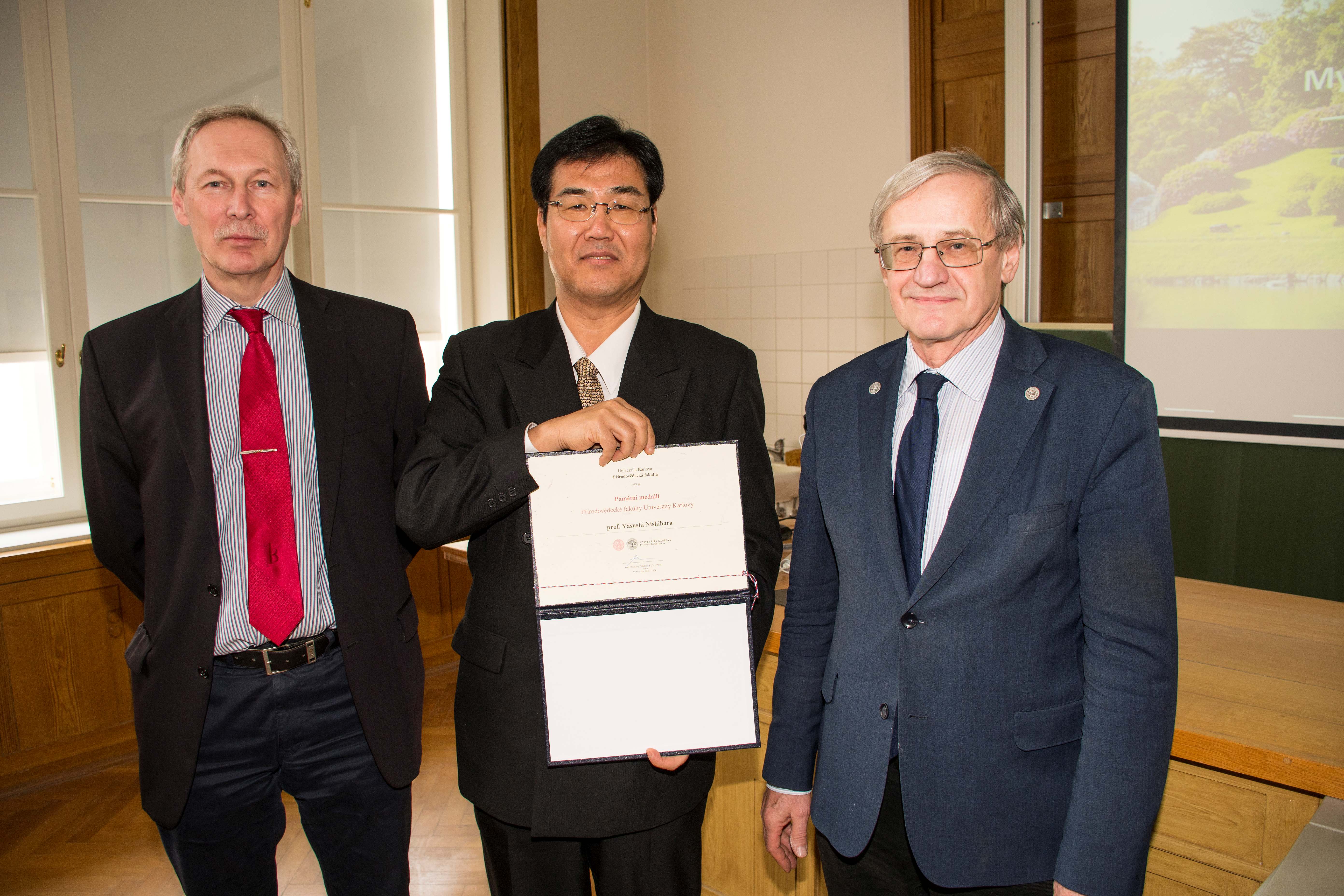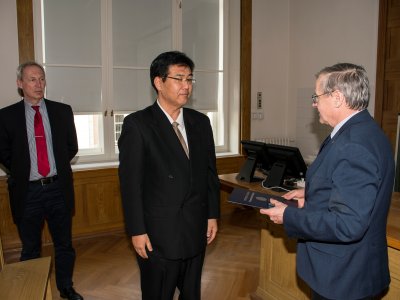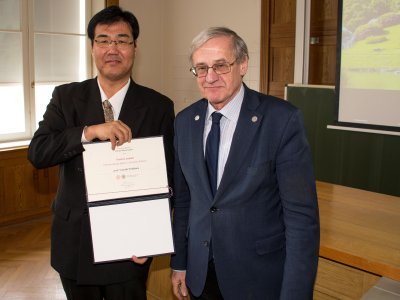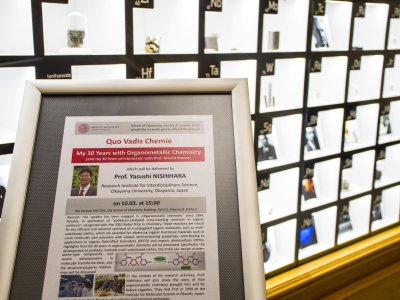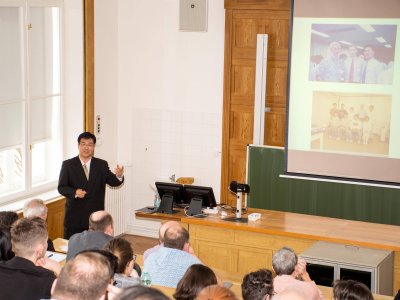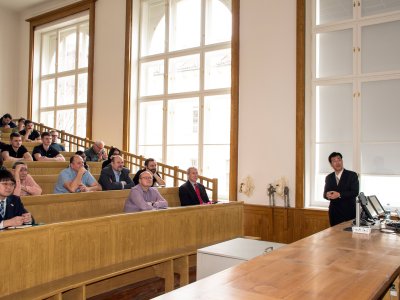Professor Nishihara has maintained long-standing collaborations with Czech scientists and actively supports student internships and academic exchanges. In this interview, he shares what led him from inorganic to organometallic chemistry, why he’s enthusiastic about palladium-catalyzed reactions, and why he believes studying abroad is an experience worth pursuing.
First, congratulations on the silver medal you received from the former dean of the Faculty of Science, professor Jiří Zima. Could you describe to our readers what the prize is for?
Thank you very much. I believe I received this prestigious Dean's Award primarily due to the Memorandum of Understanding (MoU) that I established in 2015 in collaboration with my longtime friend, Professor Martin Kotora, and other faculty members. Through this program, we have facilitated student exchanges, sending four students to Charles University for several months and welcoming two students to Okayama University. Additionally, we have co-authored numerous research papers. I am truly grateful for this award, which acknowledges my contributions to fostering academic exchange and collaboration.
From what I read on your website; you specialize in functional organic chemistry. I think most of our readers can imagine what organic chemistry is, but could you explain a bit the „functional organic chemistry“?
The name of our laboratory reflects the fusion of functional materials and organic chemistry. Our goal is to discover new organic compounds with novel reactivity or functionality and to develop reactions and materials that could one day be featured in textbooks. We believe that most π-conjugated organic molecules (molecules in which single and double bonds alternate, ed. note) inherently possess some form of functionality. For instance, we are particularly interested in π-conjugated molecules for use in organic semiconductors, which also ties into the field of organic thin-film solar cells. Additionally, organic compounds hold the potential to exhibit extremely high superconductivity. Personally, I also find the name 'Functional Organic Chemistry' appealing for our lab, because, well, it just sounds great! (laughs)
It really does. You also gave a very interesting lecture during your visit here in Prague, from which I got interested in the “palladium-catalyzed cross-coupling reactions in organic syntheses” which have been recognized by the Nobel Prize in chemistry in 2010. Can you explain a bit about the significance of these reactions?
Since organic molecules are primarily composed of carbon atoms, a fundamental aspect of organic chemistry lies in developing strategies to construct carbon-carbon bonds. In this context, palladium-catalyzed cross-coupling reactions are particularly important, as they facilitate the formation of carbon-carbon bonds between benzene rings. Before the development of cross-coupling reactions, there was no established method for forming this type of carbon-carbon bond. Since then, these reactions have become invaluable for synthesizing organic compounds with a broad range of functionalities, including pharmaceuticals, dyes, agricultural chemicals, and detergents. Their profound impact on chemistry was formally recognized when the Nobel Prize was awarded in 2010.
When I did some preparation for this interview, I saw in your CV that you studied a bachelor's in inorganic chemistry and then switched to organic chemistry. Now you are pursuing organometallic chemistry, which is sort of in the middle between the two fields, so what made you switch to organic chemistry?
I first joined a chemistry research group at Hiroshima University, where my mentor specialized in coordination chemistry. In 1992, I met Professor Ei-ichi Negishi, a Nobel laureate who was already a superstar in his field, and his work sparked my fascination with organometallic chemistry. Although I had explored the synthesis of these complexes during my undergraduate studies, it was under his guidance that I deepened my understanding of their potential as catalysts for organic reactions. Later, during my master's program, I joined the University of Notre Dame as a visiting researcher and spent nearly a year working on metallaborane clusters (molecules in which metal and boron atoms are connected in 3D structure, ed. note). While my research background was in inorganic chemistry, my interest had already shifted toward organic chemistry. In 1994, I joined the research group of Professor Tamotsu Takahashi, a former postdoc of Professor Negishi, where I first met Professor Kotora, who was a postdoc at the time. Over time, my research has evolved from inorganic chemistry to organometallic chemistry, then to synthetic organic chemistry, and now, it focuses on the synthesis of functional materials. This progression felt quite natural to me—perhaps because I am easily bored and always eager to explore new frontiers in chemistry.
Your lecture here focused on the highlights of your career, so for the people, who could not attend the lecture, what would you say is the biggest highlight of your career?
In this lecture, I want to emphasize the importance of truly enjoying the relationships you build with your mentors and colleagues. A key turning point in my career was meeting my first mentor, Professor Hiroshi Nakazawa, during my undergraduate studies at Hiroshima University. He was an exceptionally sociable person who introduced me to organometallic and coordination chemistry. More importantly, he strongly encouraged me to go abroad as early as possible in my career. Thanks to his support, I had the opportunity to study at the University of Notre Dame in the United States. At that time, it was still uncommon for students to conduct research abroad while still in school. In fact, my experience studying abroad as a master’s student at Hiroshima University was the first of its kind. Without a doubt, that experience became a major turning point in my life. This is precisely why I always encourage students to take the opportunity to study abroad as young as possible.
Thank you for the interview and I wish you a lot of success in your future career.
Magda Křelinová
